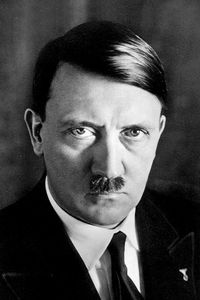Person Biography:
Adolf Hitler was born on April 20, 1889, in Braunau am Inn, Austria-Hungary, to Alois Hitler and Klara Polzl. He was the fourth of six children and grew up in a small Austrian town. Hitler was a slow learner and did poorly in school, often being beaten by his authoritarian father. He attempted to run away from home at the age of 11 but was unsuccessful.
After his father's death in 1903, Hitler moved to Vienna to pursue a career as an artist, but was rejected twice by the Vienna Academy of Fine Arts. He became an ardent German nationalist and joined the German army during World War I, where he served as a message runner and saw combat.
After the war, Hitler became involved in politics and joined the German Workers' Party, which later became the Nazi Party. He rose through the ranks, becoming party spokesman in 1919 and later renaming the party the National Socialist German Workers' Party (NSDAP/NAZI). Hitler became the party's leader in 1921 and began to build a power base.
In 1923, Hitler attempted a coup against the Bavarian government, known as the "beer hall putsch," but it failed, and he was arrested and sentenced to prison. While in prison, Hitler dictated his book "Mein Kampf" to his deputy, Rudolf Hess.
After his release from prison, Hitler began to rebuild the Nazi Party, securing the backing of wealthy industrialists and gaining support among German veterans and the military. He ran for president in 1931 but lost, and then attempted to become chancellor, succeeding in 1933.
As chancellor, Hitler began to consolidate his power, issuing emergency decrees and abolishing trade unions. He also began to purge the SA, a paramilitary organization that had become a threat to his power, and eventually took control of the entire government.
Hitler's regime was marked by aggressive military expansion, anti-Semitic policies, and the persecution and extermination of millions of people, including Jews, Romani people, homosexuals, and people with disabilities. He also launched a massive military campaign against the Soviet Union, known as Operation Barbarossa, which ended in defeat.
In the final years of World War II, Hitler's mental and physical health began to decline, and he became increasingly isolated and paranoid. He married his longtime mistress, Eva Braun, just before his death in April 1945, as Soviet forces approached Berlin. Hitler's body was taken to Moscow, where it was later shown to Allied leaders, and his personal items are now part of the permanent collection at the National History Museum in Moscow.








































































































































































































































































